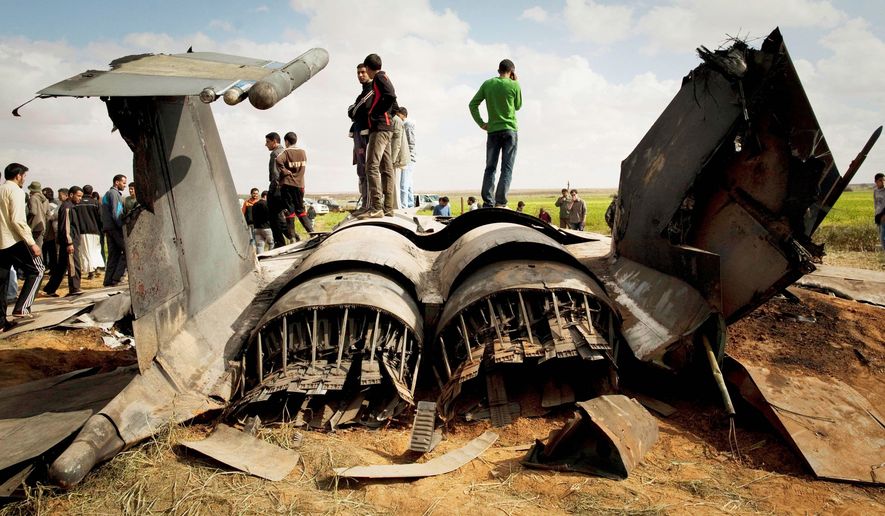The allies in the U.S.-led military operation in Libya debated a new command structure Tuesday, with differences over the ultimate aims and scope of the campaign impeding an agreement, as forces loyal to dictator Moammar Gadhafi shelled the coastal city of Misurata.
There were also growing questions about how much the Odyssey Dawn operation will cost and who will pay for it, as many participating nations are dealing with budget constraints in the aftermath of the global economic downturn.
President Obama, in the midst of a Latin America trip, spoke Tuesday with British Prime Minister David Cameron and French President Nicolas Sarkozy. A White House aide said all three agreed that NATO should have a key role in the command, but the details were still to be worked out.
“This is not finalized, so I don’t want to suggest that it is,” said Ben Rhodes, deputy national security adviser for strategic communications. “This is still being worked in Brussels.”
Observers suggested that an agreement would be hard to reach, given the divergence of opinion. Mr. Obama has said Col. Gadhafi should step down, but his ouster is not the goal of the U.N. operation. Allies, including France, have said that overthrowing Col. Gadhafi is a key objective.
Mr. Obama said Tuesday that the U.S. is seeking to hand off the leading role in the operation “over the next several days.”
“NATO is in complete disarray,” James Ludes, director of the think tank the American Security Project, told The Washington Times. “Everyone seems to have a different idea about what this is and where it is going.”
If the world leaders cannot reach an agreement, “we will be left holding the baby,” Mr. Ludes said.
Meanwhile, the crash of a U.S. fighter jet late Monday and reports that a U.S. rescue crew had fired on Libyan villagers underscored the complex and sometimes chaotic nature of the U.N.-mandated operation.
The two Air Force fliers ejected from their F-15E after it developed mechanical difficulties and were safe and in U.S. hands with only minor injuries, officials said.
But Britain’s Channel 4 News reported that six villagers had been hit by fire from the U.S. search-and-rescue craft that came to recover them.
“I cannot confirm that,” said Air Force Maj. Beverly Mock, a spokeswoman for U.S. Africa Command, which is in charge of the operation. She said an investigation into the crash and its aftermath was under way.
Meanwhile, White House officials said Mr. Obama likely would leave San Salvador a couple of hours early Wednesday, but would hold a teleconference with national security advisers before departing.
As the diplomatic debate continued, forces loyal to Col. Gadhafi rode in tanks through the streets of Misurata shelling homes while residents were still indoors, killing and wounding scores, including children, eyewitnesses told The Times.
A resident of Misurata, about 130 miles east of Tripoli, said pro-Gadhafi forces had killed 90 people and wounded more than 1,000 over the past five days. Thirteen were killed Tuesday, he said.
The figures could not be independently verified.
“Families in their homes have been bombed by tanks,” the resident said, speaking to The Times on his satellite phone and on the condition of anonymity owing to concern for his safety.
Another resident, Mohamed Benrasali, a member of the provisional committee administering Misurata, said the regime’s tanks were razing the city.
Pro-Gadhafi forces have taken control of the main street into the city and occupied the city center, he said. Snipers were firing indiscriminately from rooftops at people in the streets.
“It’s like shooting practice for them,” Mr. Benrasali said.
Misurata has been without water and electricity for nine days, and its hospitals are relying on power generators.
The city’s main hospital was being renovated, and its two clinics have been strained by the high volume of casualties of the fighting, he said. The clinics also were dangerously low on medical supplies.
“We really need the international community to concentrate on Misurata. Misurata is in big trouble. We are the last stronghold of the revolution on the west coast, and we must be preserved,” Mr. Benrasali said.
Residents said the U.S.-led coalition should conduct surgical strikes on the pro-Gadhafi forces’ supply lines.
The rebels said they have provided maps and coordinates of potential targets to the coalition force, but U.S. officials repeated Tuesday that they were not coordinating with them.
“I haven’t had any unofficial communications or official communications with the … opposition forces,” the commander of the operation, Navy Adm. Samuel Locklear III, told reporters at the Pentagon.
He said 13 nations were taking part in Odyssey Dawn or had forces en route to join.
Despite the growing ranks of the coalition in the Mediterranean, questions continued at home about the cost of the operation, which entered its fourth day Tuesday with more strikes by Tomahawk cruise missiles, bringing the total number to 161.
According to figures from the Pentagon comptroller’s latest selected acquisition report, the new tactical Tomahawks are $1.16 million each, including the costs of research, development and testing.
“That’s pushing $200 million right there,” said Mr. Ludes.
The Center for Strategic and Budgetary Assessments, another Washington think tank, estimated last week that the initial establishment of the U.N.-mandated no-fly zone could cost $400 million to $800 million, and then as much as $100 million per week to maintain.
“We’ve taken on a big financial responsibility just with the operational piece,” Mr. Ludes said, adding that other costs would be incurred even if the military action comes to a swift end.







Please read our comment policy before commenting.